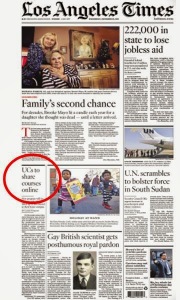Our earlier post had the Regents audio for the first part of the meeting of 9-17-13. There was then a closed session. The audio link below picks up the meeting again when the public component resumed. We also noted in the previous post that there was a inadvertent hot mike at the beginning of the meeting in a supposedly closed session which transmitted sensitive material online. We have not archived that portion. However, when the meeting reopened in a public session, apparently some Regents were not sensitive to what was going out. The audio begins with one Regent telling another that he let Nathan off easy on Blake House. Blake House is the possible residence of the incoming UC president that would require renovations and repair. There is more of that in the link below towards the end.
In this session, there was discussion of installation of solar panels at two campuses: Davis and Riverside. Both campuses indicated that the electricity cost – after various govt. subsidies – would be comparable to the cost from outside sources. An interesting point was that having solar installations would not help were there to be an external power failure. The solar component would shut down in such events to prevent damage. UC-San Francisco presented an upgrade and construction plan involving seismic work, among other elements. There was discussion of a new ocean pier for Scripps/UC-San Diego. UCLA sought authorization for design of a new engineering building. A question was raised about how, given that this was the design phase only, UCLA somehow had rather precise estimates of construction costs. It was noted also that because of the release of such advance estimates, it would be unlikely that UCLA’s prospective contractors would come in with lower bids, even if costs were actually lower. Lt. Gov. Newsom asked what was really being committed here. If you start down the road of just approving design costs, doesn’t that effectively commit you to the entire project? He was assured that the costs approved were just for design. Good question, Mr. Lt. Governor. The answer was not so good. In fact, once you get a train rolling at the Regents, it does leave the station.
Then we come to the Blake House discussion for which Nathan was let easily off the hook, as per above. Apparently, the house is not in good shape and has a leaky roof and related damage. The approval sought was to do repairs. There were questions about whether UC could just sell the building and land and use the proceeds for something else. It was noted that the location, 4 miles from Berkeley, was not ideal for a president’s residence or other uses. Nonetheless, repairs were authorized with promises from UCOP that there would be a more thorough evaluation forthcoming in the future.
You can hear the audio at the link below:









